

Nachhilfe. Schreiben. Emotionen und Lernen. Reflexion. Messy learning. Edchat. Protocol and Educational Development. About Rounds.....
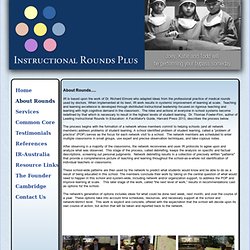
IR is based upon the work of Dr. Richard Elmore who adapted ideas from the professional practice of medical rounds used by doctors. When implemented at its best, IR work results in systemic improvement of learning at scale. Teaching and learning excellence is developed through distributed instructional leadership focused on rigorous teaching and learning with high cognitive demand in the classroom. The roles and actions of everyone in school systems become redefined by that which is necessary to result in the highest levels of student learning. The process begins with the formation of a network whose members commit to helping schools (and all network members) address problems of student learning. After observing in a majority of the classrooms, the network reconvenes and uses IR protocols to agree upon and analyze what was observed. The network's generation of options includes ideas for what could be done next week, next month, and over the course of a year.
The Other 21st Century Skills. Many have attempted to identify the skills important for a learner today in this era of the 21st century (I know it is an overused phrase).
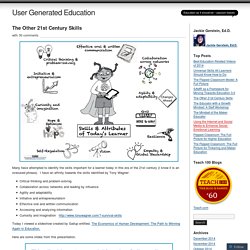
I have an affinity towards the skills identified by Tony Wagner: Critical thinking and problem-solvingCollaboration across networks and leading by influenceAgility and adaptabilityInitiative and entrepreneurialismEffective oral and written communicationAccessing and analyzing informationCuriosity and imagination Today I viewed a slideshow created by Gallup entitled, The Economics of Human Development: The Path to Winning Again in Education.
Six Ways To Motivate Students To Learn. Scientific research has provided us with a number of ways to get the learning juices flowing, none of which involve paying money for good grades.
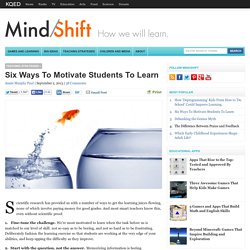
And most smart teachers know this, even without scientific proof. 1. Fine-tune the challenge. Deep learning. Kitas. Portfolio. Hochschul-Bildungs-Report 2020. Hochschulbildung: Herausforderungen, Entwicklungen, Zielmarken Welche Hochschulbildung braucht Deutschland im Jahr 2020?
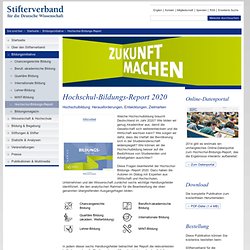
Wie bilden wir genug Akademiker aus, damit die Gesellschaft sich weiterentwickeln und die Wirtschaft wachsen kann? Wie sorgen wir dafür, dass die Vielfalt der Bevölkerung sich in der Studierendenschaft widerspiegelt? Wie können wir die Hochschulbildung besser auf die Bedürfnisse von Studierenden und Arbeitgebern ausrichten? Diese Fragen beantwortet der Hochschul-Bildungs- Report 2020.
Hausaufgaben. Noten. Medienpädagogik. Schulbetreuung. Lerntools. LdL. Die besten Lerntricks: 55 Tipps: So wird Ihr Kind zum Überflieger - Wer falsch lernt, ist selber schuld. Manchmal hakt es einfach: Das Gedicht will nicht in den Kopf, und Mathe ist zu kompliziert.
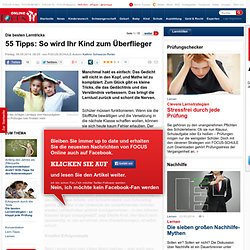
Zum Glück gibt es kleine Tricks, die das Gedächtnis und das Verständnis verbessern. Das bringt die Lernlust zurück und schont die Nerven. Schüler müssen funktionieren. Selbstgesteuertes Lernen. Konzeptualisierung als Glücksquelle. Posted on 2.
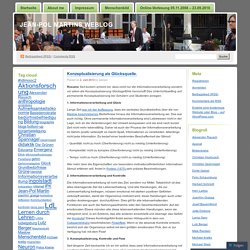
Juni 2013 by jeanpol Resume Seit kurzem scheint mir, dass nicht nur die Informationsverarbeitung sondern vor allem die Konzeptualisierung Glücksgefühle hervorruft! Das Unterrichtssetting soll permanente Konzeptualisierung bei Schülern und Studenten anregen. 1. Informationsverarbeitung und Glück. What sets high achievers apart? In her 20s, Angela Lee Duckworth, PhD, tried out a couple of different career paths, working as a management consultant and a middle-school teacher.
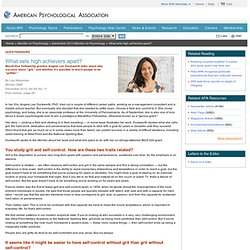
But eventually she decided that she needed to settle down, choose a field and commit to it. She chose psychology, and today, she is an associate professor at the University of Pennsylvania. As of September, she is also one of only about a dozen psychologists ever to win a prestigious MacArthur Fellowship, otherwise known as a "genius grant. " Her story — picking a field and sticking to it, then excelling — in some ways illustrates her work. EDUCERI. Multiple Intelligences in the Classroom - Zoe Isberg. Multiple Intelligences.
Learning Styles Quiz Results: Digging Deeper. Learn more about each learning style: naturalistic, bodily-kinesthetic, musical, interpersonal, intrapersonal, visual-spatial, logical-mathematical, and verbal-linguistic.
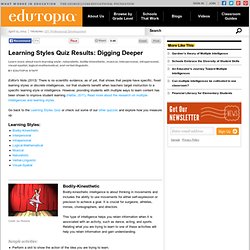
Editor's Note (2013): There is no scientific evidence, as of yet, that shows that people have specific, fixed learning styles or discrete intelligences, nor that students benefit when teachers target instruction to a specific learning style or intelligence. However, providing students with multiple ways to learn content has been shown to improve student learning (Hattie, 2011).
David Goldberg: Below the Waterline: A Deep Dive to Rethink Engineering Education. If we think of engineering education as an iceberg, many educators are focused on the visible part of the iceberg -- the part above the waterline.
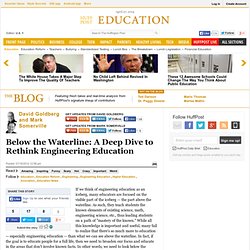
As such, they teach students the known elements of existing science, math, engineering science, etc., thus leading students on a path of "mastery of the known. " While all this knowledge is important and useful, many fail to realize that there's so much more to education -- especially engineering education -- than what we can see above the waterline. In fact, if the goal is to educate people for a full life, then we need to broaden our focus and educate in the areas that don't involve known facts.
In other words, we need to look below the waterline. Focusing above the waterline and filling young minds with known facts and knowledge used to be sufficient for engineering education. This need for competent lifelong learning shifts the focal point of education. A Focus for the Future. Landesschulamt und Lehrkräfteakademie - Hattie-Studie. Umfangreiche Studie zur Wirksamkeit von Lehren und Lernen.
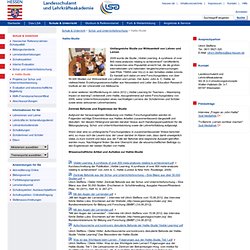
5000 Year Timeline of Learning Theories. Freire. Bruner. Connected learning. Vygotsky. Pai Obanya. Perkins. Maslow. Life long learning. What do we learn in school? Why do we send our kids to school? We’ve been told that it is in elementary school that the bases of learning to read, write, and do math are acquired, although anyone who spends any time with children can clearly see that children want to learn what we do.
They want to learn to read if they see us reading, to write if they see us writing, and to count if they see us counting. What do they want our kids to learn? As observed by Jan D. Matthews in Towards the Destruction of Schooling, the modern school is a social institution that was created in the context of the development of industrial capitalist society. It aims to prepare a work force that is easily manipulated and can adapt to the needs of the economy. MOOCs: Too Much Hype, or Not Enough? Image: courosa/Flickr Earlier this month, I went to an eLearning conference in Saudi Arabia and again, the topic of Massive Open Online Courses, or MOOCs, came up.
But, they were discussed very differently at this conference than I have described in past posts. For the past few years, I have noted that MOOCs are the easiest way to get attendance at eLearning conference presentations. About 25-35% of conference sessions talked about the – mostly from a, “How You Can Do It” perspective although there were always a few asking if we should, “Believe The Hype?”
Lebenslang lernen - Lerntipps für Erwachsene - Meldung. Sprachen, IT-Wissen, Führungskompetenzen – viele Berufstätige müssen heutzutage ständig etwas dazulernen. Mit der richtigen Lernstrategie ist das auch für Erwachsene im fortgeschrittenen Alter leicht zu schaffen. test.de stellt die zehn wichtigsten Tipps zum Thema lebenslanges Lernen vor. 1. Lernen Sie regelmäßig Regelmäßigkeit führt zum Lernerfolg: Es ist effizienter, jeden Tag eine Stunde zu lernen, als an einem Tag von morgens bis abends.
Beim Sprachenlernen sind sogar noch kleinere Zeiteinheiten sinnvoll, etwa viermal täglich fünfzehn Minuten.
Institute of Play. Größenwahn der Pädagogen : Warum Bildung heute maßlos überschätzt wird - Nachrichten Kultur. Artikel per E-Mail empfehlen Warum Bildung heute maßlos überschätzt wird Deutschland ist zu einer freudlosen Erziehungsanstalt verkommen. Eisenmed.